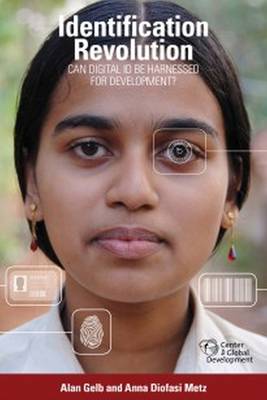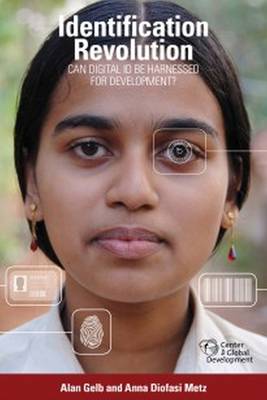
- Retrait gratuit dans votre magasin Club
- 7.000.000 titres dans notre catalogue
- Payer en toute sécurité
- Toujours un magasin près de chez vous
- Retrait gratuit dans votre magasin Club
- 7.000.0000 titres dans notre catalogue
- Payer en toute sécurité
- Toujours un magasin près de chez vous
Identification Revolution
Can Digital Id Be Harnessed for Development?
Alan Gelb, Anna Diofasi
Livre broché | Anglais
23,95 €
+ 47 points
Description
Some 600 million children worldwide do not legally exist. Without verifiable identification, they--and unregistered adults--could face serious difficulties in proving their identity, whether to open a bank account, purchase a SIM card, or cast a vote. Lack of identification is a barrier to full economic and social inclusion. Recent advances in the reach and technological sophistication of identification systems have been nothing less than revolutionary. Since 2000, over 60 developing countries have established national ID programs. Digital technology, particularly biometrics such as fingerprints and iris scans, has dramatically expanded the capabilities of these programs. Individuals can now be uniquely identified and reliably authenticated against their claimed identities. By enabling governments to work more effectively and transparently, identification is becoming a tool for accelerating development progress. Not only is provision of legal identity for all a target under the Sustainable Development Goals, but this book shows how it is also central to achieving numerous other SDG targets. Yet, challenges remain. Identification systems can fail to include the poor, leaving them still unable to exercise their rights, access essential services, or fully participate in political and economic life. The possible erosion of privacy and the misuse of personal data, especially in countries that lack data privacy laws or the capacity to enforce them, is another challenge. Yet another is ensuring that investments in identification systems deliver a development payoff. There are all too many examples where large expenditures--sometimes supported by donor governments or agencies--appear to have had little impact. Identification Revolution: Achieving Sustainable Development in the Digital Age offers a balanced perspective on this new area, covering both the benefits and the risks of the identification revolution, as well as pinpointing opportunities to mitigate those risks.
Spécifications
Parties prenantes
- Auteur(s) :
- Editeur:
Contenu
- Nombre de pages :
- 272
- Langue:
- Anglais
Caractéristiques
- EAN:
- 9781944691035
- Date de parution :
- 30-01-18
- Format:
- Livre broché
- Format numérique:
- Trade paperback (VS)
- Dimensions :
- 152 mm x 229 mm
- Poids :
- 362 g

Les avis
Nous publions uniquement les avis qui respectent les conditions requises. Consultez nos conditions pour les avis.






